When is the best time for Everest Base Camp Trek in Nepal?
It is essential to choose the right time and weather according to the destination for your trekking journey to avoid any kind of mishap and trouble. Knowing about the weather conditions of the place you're visiting beforehand is crucial and plays an important role in how the trip will unfold. Among all the seasons, spring and autumn are the two seasons considered best time to complete the Everest Base Camp Trek in Nepal.
This is the most suitable time to enjoy the diverse nature of the Everest region. During these months, the weather is fairly stable, with good visibility and a moderate temperature. The clear skies in the spring, along with the trail full of plants and flowers, make it one of the best times for Everest trekking.
- Autumn (September to November)
Similar to the spring season, autumn is another perfect season to trek. The weather is very transparent, with moderate temperatures, making it possible for trekkers to relish the Himalayan scenery without much hassle.
However, keep in mind that both spring and autumn are the peak trekking seasons in Nepal, when most of the trekkers get down to the trails. It is highly recommended to book in advance during peak season, as the trail is usually packed.
The monsoon season brings heavy rainfall to the Everest region, and it is not considered the right time for the trek. You can expect cloudy conditions with frequent rainfall, especially in the afternoon and evening. The trails can be muddy, slippery, and prone to landslides due to the rainfall. On the positive side, the monsoon season brings lush greenery to the Everest region.
- Winter (December to February)
Winter in the Everest region is extremely cold, with temperatures dropping well below freezing point, especially at higher elevations. It can be challenging to trek in cold temperatures, particularly during early mornings and nights. The snowy conditions can make the trail more challenging, and you will require proper equipment, such as crampons and warm clothing. Winter, however, offers stunning panoramic views of the snow-capped mountains.
A Guide to Accommodation during the Everest Base Camp Journey
This package includes a 3-star hotel in Kathmandu and tea houses/lodges along the trail for the 14 days of the trek. The accommodation facility during the trip to Everest Base Camp is much better and more advanced compared to other parts of Nepal, as it is one of the most popular trekking destinations in the world.
In the beginning few days of the trek up to Namche Bazaar, you can enjoy the hotel rooms that come with in-room showers and hot water, western-style flush toilets, a WIFI connection, and in-room plugs to charge your stuff in extra cost. As you ascend to a higher elevation, the facilities get limited, and you might not be able to enjoy services like WiFi connections and western-style flush toilets. The cost of the accommodation depends on the level of facilities provided by the lodges.
Moreover, you might have to pay extra costs for the hot showers and WIFI connections in the higher elevation where the room comes with a simple accommodation package like a warm bed and blankets, depending on the destination and lodge.
Overall, you will get to enjoy a simple yet inclusive accommodation facility during the 14 Days Everest Trek that supplies you with all the basic necessities.
An Insight into the Food Options Included in EBC Trek Package
Similar to the accommodation facility, the food choices you get during the trek are diverse and refined. You can expect a wide range of foods during the 14-day trek, ranging from traditional village foods to Western foods.
In the first few days of trekking, you can enjoy food from Western and other international cuisines to traditional Nepali food. As you move to a higher elevation, the menu gets limited and the cost gets higher. The breakfast usually includes traditional bread, eggs, potatoes, and soup, while lunch and dinner items include Dal Bhat (lentil soup, rice, and veggies), fried rice, noodles, etc., according to the lodges.
Some of the lodges along the trail also offer dishes like pizza, pasta, sandwich, burgers, etc. You can further carry some snacks to enjoy during the trek, including chocolate bars, nuts, and crackers. It is advised not to consume alcoholic beverages, caffeine, and other unhealthy food items while you are at high elevation, as it can affect your stamina and walking pace.
Drinking water facilities during the Everest Base Camp Trek
Drinking water is easily accessible at the taps along the trail. However, tap water is not always considered safe to consume directly; thus, we suggest you go for a mineral water bottle.
The best option is to treat water from local sources to ensure its safety. You can use water purification tablets or filters to make tap water safe for drinking.
Carrying a reusable water bottle and using a purification tablet instead of a mineral water bottle is also recommended to minimize plastic waste in the environment and practice eco-friendly travel.
Essential Permits for the Everest Base Camp Trek
There are two different permits you need to acquire for the trek. Detailed information about the necessary permits is mentioned below:
- Khumbu Pasang Lhamu Rural Municipality Entrance Permit
The Khumbu PasangLhamu Rural Municipality entrance permit is a new permit imposed on October 1, 2018, replacing an existing TIMS card. The permit costs NPR 2000, which cannot be obtained in Kathmandu. If you are flying through Lukla, you can obtain a permit in Lukla. And if you are trekking from Jiri or Salleri, this permit can be obtained in Monjo.
- Sagarmatha National Park Entry Permit
The second permit you need to obtain for the trek is the Sagarmatha National Park entry permit. The cost for the permit is NPR 3000 per person, which can be obtained either in the Nepal Tourism Board office or in an office at Monjo.
Guiding trekkers to the Everest Base Camp, Your Trusted Companion in the Himalayas
For your 14-day trek to Everest Base Camp, you'll be guided by our experienced and skilled guides or Sherpa. Our Everest package includes guides who are professionally trained with years of experience and have been to the Base Camp and back many times. Not just the guidance during the 14 days of the trip, but you'll also get a chance to learn new things and acquire knowledge from our guides. As they are highly skilled and have a wide range of knowledge, from mountaineering and trekking to the culture and traditions of Nepal, you can rest assured that you will have a fun and enjoyable trek.
Understanding Lukla's flight Delay and Cancellation during the Everest Trek
One of the major highlights of trekking in the Everest is the thrilling flight to Lukla. The trek begins with a flight from Kathmandu to the Tenzing-Hillary airport in Lukla, which is a small single-landing strip airport surrounded by the high Himalayas. The flight from Kathmandu to Lukla is short and takes around 30 to 40 minutes, offering you a scenic view of the giant peaks and vibrant valleys.
Flight delays and cancellations are some of the common problems that can occur during your travels to Lukla. Given the position and elevation of the place, weather conditions and visibility are hard to predict and can change rapidly. Consequently, flight schedules to Lukla can be affected. When the weather conditions aren't good and there is the risk of an unsafe landing, the airline doesn't take any risk and returns the flight immediately to Kathmandu. Such flight delays are likely to happen at any time of year, especially during the monsoon season (late May to early September).
In case of a flight delay, you will have to wait until the flight gets rescheduled. There is also a chance of a flight getting canceled after you've waited a few hours at the airport. In case of flight cancellation, you can either wait a few days to take the next scheduled flight or take a helicopter flight on the same day.
Therefore, it is highly recommended to add at least two extra days to your trip for flexibility in case of any Lukla flight delay or cancellation.
Can I upgrade my flight to a Helicopter ride from Kathmandu to Lukla and back?
Yes, you can upgrade the flight to a helicopter ride from Kathmandu to Lukla and back for your Everest trek. Upgrading your flight to a helicopter ride from Kathmandu to Lukla and back will have additional charges of About 550 USD-700 USD Per Head each way, The Helicopter cost can vary according to the group size and availability. You can discuss this option with us in more detail before embarking on the trek.
The difficulty level of the Everest Base Camp Trek
The Everest Base Camp Trek falls under the Difficult or Grade C level of trekking. Also known as adventure trekking, this grade of trekking is comparatively harder than the moderate level and involves trekking on elevations above 5000 m.
Trekkers are required to be fitted with high stamina without any pre-existing health conditions. As the trip involves walking on rough terrain for 5–6 hours every day on average, with the altitude gain per day ranging between 500 m and 800 m, experienced trekkers are more suitable for the Everest trek.
There is also a chance of getting altitude sickness, as the highest elevation you will reach during the trek is above 5500 m. To avoid altitude sickness, it is recommended to keep yourself hydrated while walking at your own pace. Furthermore, getting physical training, like walking, hiking, cycling, etc., before the trek can be beneficial for the entire journey.
Packing for an Epic Journey to Everest Base Camp: Your Equipment Checklist
Here we have prepared a list of all the necessary trekking gear and equipment for Everest Base Camp. Most of the equipment can be easily purchased in Kathmandu. You can either buy or rent the equipment and gear. Also, don’t forget that it is very important to purchase good-quality and reliable clothes and footwear, as you will be facing harsh weather conditions on the trek. Below is the packing list for the Everest Base Camp Trek.
- Clothing: -Baselayer -Insulation layer -Third layer
- General Trekking gear -Trekking trousers and Shirts; -Trekking Shorts; -Waterproof shell jacket and Trousers; Underwear
- Headwear: -Hat -Beanie -Neck gaiter
- Handwear and Footwear -Inner Gloves -Outer insulated gloves -Hiking boots -Trekking shoes/sandals -Hiking socks -Warm thermal socks -Gaiters
- Bags and backpackers: -Duffel bag -Backpack -Day back -Raincover -Drybag
- Sleeping gear: -Sleeping bag -Liner -Earplugs
- Poles and Headgear: -Trekking poles -Sunglasses -Headlight
- Important accessories: -Water bottle/Hydration bladder -Towel -Pee funnel -Lock -Waterproof bag
- Extra accessories: Camera, -Portable charger -Books -Cards -Passport, Money
- Medications & Toiletries: Water Purification Tablet, Isotonic Powder, Common Medications, First Aid Kit, Sunscreen, Baby Wipes, Toiletries, Plasters, Hand Sanitizer
Budgeting for the Journey: Everest Base Camp Trek Cost Details
The Everest Base Camp Trek Package cost generally ranges from USD 1000 to USD 2000 on average for a 10-16 day journey. The cost can, however, vary depending on several factors, like the number of trekkers in a group, the quality of accommodation you require, and the length of the trek.
The mentioned EBC Trek Cost includes domestic flights, transportation, trekking permits, food (Breakfast, Lunch and Dinner), a professional trek guide, a porter, and accommodations costs during the trek. Discounts are available for groups.
It is furthermore recommended that you carry extra cash in case of emergencies and for miscellaneous expenses like extra food, drinks, and tips during the trek.
- EBC Group Trip Cost for 2025–2026 (100 % Fixed Guaranteed Departure)
We specialize in organizing a wide range of cost-effective group trips to suit the preferences of all individuals. If you have a preference for traveling in a group for the 14-day Everest trek, we can make the necessary arrangements to ensure a budget-friendly experience.
The advantage of joining a group trip is that it allows for significant cost savings. As we offer 100% fixed departure dates, the cost for a group trip can be lower compared to other options, making it an affordable choice. We offer attractive group discounts based on the number of trekkers participating, resulting in significant cost reductions. Typically, we offer a 20% discount on group trips, allowing you to enjoy the trek at a lower cost.
The overall cost of the trek decreases even further as the number of trekkers in the group increases, making it an extremely cost-effective option. Don't hesitate to select a departure date from our list or reach out to us for a customized Everest trekking itinerary that fits your time and budget.
- EBC Private Trip Cost for 2025, 2026
If you do not prefer traveling in a group and would rather have a more personalized experience, we can arrange a private trip for you. Whether you are a couple, a family, or a group of friends consisting of more than two people, we can tailor a private trip for the Everest Base Camp Trek based on your preferred time, preferences, and individual needs.
However, it's important to note that the cost of a private trip for the Everest Trek Package can be higher compared to a group trip due to the services and personalized attention provided. The level of service can impact the overall cost. The cost of the private trip can vary depending on factors such as the number of trekkers, the duration of the trip, the level of customization, and any additional services or accommodations included.
You can select any of the available departure dates to embark on your private trip. We can customize all the factors of the package according to your preferences. However, it's important to keep in mind that any changes or personalized services will affect the overall cost of the trip.
- EBC Solo Trip Cost for 2025–2026
If you do not have any travel partners to embark on the adventure to Everest Base Camp, there's no need to worry. We specialize in organizing trips for solo travelers and have tailored packages specifically designed for those seeking a solo trekking experience. We highly encourage you to join our 14-day trip to Everest Base Camp.
The cost of the standard EBC Trek package for a solo traveler is approximately USD 1469. However, please note that the cost can vary depending on the included facilities, services, and any additional requests you may have. As there are a limited number of lodges and teahouses available at high altitudes, it's important to note that you may have to share a room with other solo trekkers during the trek.
Additionally, the cost of a solo trip can be slightly higher compared to other trips, as you will be receiving most of the services and facilities solely for yourself. This personalized and tailored experience contributes to the overall enjoyment of your solo adventure. Please feel free to select one of our fixed departure dates or reach out to us for any further inquiries or customization requests.
- EBC Female Trip Cost for 2025–2026
We also organize trips designed for solo female travelers. If you are a single female trekker and have a desire to embark on the adventurous journey to Everest Base Camp, whether solo or in a group, we are here to ensure a safe and enjoyable trekking experience.
All our Everest Base Camp Packages prioritize the safety and comfort of our clients above all else. If you wish to join a group for the trek, the cost can be significantly lower compared to a solo trip. Group trips allow for cost-sharing and offer the opportunity to connect and share experiences with fellow travelers. On the other hand, if you prefer to go solo, the cost may be relatively higher due to the personalized services and individual attention provided. Please feel free to select any of our fixed departure dates that match your schedule and preferences. Our team is available to address any further queries regarding the cost breakdown and inclusions for both group and solo trips.
Understanding Tipping Culture for the Everest Trek
Tipping during Everest or any other trek in Nepal is a common tradition to show appreciation for the services provided by guides, porters, and support staff. It is normal to tip depending on the quality of service and individual preference.
It is also a way to express gratitude for their hard work in making your trek memorable. The cost of the tip depends on you, according to the services you received.
Importance of travel insurance for the Everest Base Camp Trek
One of the most important components when starting any trip in the Himalayas is travel insurance. Having travel insurance is crucial and required for the trek because the Everest Base Camp Trek is difficult and involves the risks of high altitude, potential altitude sickness, and other unforeseen possibilities.
The cost of travel insurance is not covered by our hiking package. Therefore, all trekkers are required to submit a copy of their certificate of comprehensive travel insurance, which should cover all medical expenses and emergency repatriation, during the booking process. The policy should also include coverage for high-altitude helicopter rescue and evacuation costs.
Useful information and some tips for the Everest Base Camp Trek
- Do not rush during the trek, as it is extremely crucial to walk at your own pace, and do not skip acclimatization days. Acclimatization days help you cope with increasing elevations.
- Keep checking your body condition, do not ignore any signs of the body, even if it is minor and make sure to follow the tips of a guide.
- Avoid embarking on the trek during off-seasons like peak monsoon and winter, as it involves certain risks and uncertainties.
- Stay hydrated throughout the trek and carry water bottles along with water purification tablets or a water filter, as drinking water along the trail needs to be treated.
- Do not expect reliable mobile networks or internet connectivity. Purchase a local SIM card in Kathmandu before starting the trek if you want to have occasional communication.
- Do not forget to carry a portable power bank to keep all electronic devices charged.
- Carry enough Nepalese currency for the entire trek, as there are limited ATMs along the route.
- Respect the local culture and traditions of the Sherpa people and the environment of the Everest region.
- Leave no plastic or other trash on the hiking trail. Be mindful of your actions and follow guidelines for responsible trekking, such as carrying your trash back and avoiding single-use plastics.
- Research the trail, weather, and local culture before you embark on the journey.
Alternative for the Trek to Everest Base Camp
Although the Everest Base Camp is one of the most renowned and sought-after trekking trails in the Everest region, there are several other alternative packages you can choose to go for with Himalayan Recreation.
The Everest region overall is filled with wonders of nature and culture, along with a diverse ecosystem. Some other alternatives include the Everest Base Camp Helicopter Trek which is a lot easier and more leisurely than the classic trek. This one is suitable for beginner trekkers and trekkers with less time. And if you want to trek to Annapurna, then Annapurna Base Camp might be the best alternative. If you want to go for a more quiet and off-beaten trail, then there are options like the Gokyo Lakes trek, Manaslu Circuit and the Everest Three Passes Trek. If you have a very short time and want to have an Everest experience, then the Everest Base Camp Helicopter tour is highly recommended.
Furthermore, all of our treks can be customized according to your time and preferences, which gives you more range to choose from.
Acclimatization and Safety Guidelines for the Everest Base Camp Trekking.
The highest point you will reach during the Everest trek is Kalapatthar, at an elevation of 5644 m, which invites the risk of altitude sickness. Especially for beginner trekkers, there is a high chance of gaining altitude sickness, which is a common concern during high-altitude treks. However, it is preventable with proper precautions and treatment.
One of the best ways to make sure that your body is adjusting well to the high altitude while avoiding the chances of getting mountain sickness is acclimatization. It is extremely important to make sure that your body gets the necessary rest. For this, between the 14 days, we have separated two acclimatization days at Namche Bazaar and Dingboche. This is the day you can take much-needed rest while also preparing for further climbs in the following days.
As a precaution, we also encourage you to keep yourself hydrated constantly all along the trek and stay away from all the alcoholic drinks. Our team will make sure that trekkers' safety is the top priority during the trek; thus, you can rest assured that you will have an adventure of a lifetime. In cases of severe sickness, you will be brought down to a lower altitude by our team immediately.
Last-minute Everest Base Camp booking with Himalayan Recreation
It is best to have the Everest Base Camp Package booked in advance for an easy and hassle-free process. However, if you are unable to book in advance due to any reason, we, Himalayan Recreation, offer last-minute booking as well.
In the case of a last-minute booking, you must provide us with the 100% trip payment 24 hours before the trek departs. Also, keep in mind that for last-minute bookings, there might be certain circumstances out of our control. Make sure to reach out to us as soon as possible for the last-minute Everest trek booking.
For Environmentally Responsible Adventures, explore the Everest Region with Himalayan Recreation
Here at Himalayan Recreation, we place a high emphasis on responsible travel. As a leading tour company committed to sustainability, we prioritize the preservation of nature and the communities we visit.
We aim to minimize our environmental impact while also enriching your trekking experience. As a traveler, we also encourage you to take part in responsible and sustainable travel practices. There are several ways to do it, such as not littering the places you visit, taking part in community-building activities, buying souvenirs from locals, and leaving nothing but a footprint along the route.
Our experienced guides will lead you through stunning landscapes while providing you with some insights into the region. Embark on environmentally responsible adventures in the astonishing Everest region with Himalayan Recreation.
Visa and currency information
Every nationality requires a visa to enter Nepal, except for Indians. It is possible to get Visa on arrival at the Tribhuvan international airport, and you can extend your visa at the central immigration office afterward.
You need to have a valid passport along with a passport-size photo to issue a visa. The visa fee costs USD 50 for 30 days, which you need to pay in cash on arrival at Tribhuvan International Airport. If you are a citizen of China and the SAARC countries, then you will receive a free visa.
As for exchanging currency, you can do so through local banks, and there are several legitimate money exchanges around Kathmandu. It is recommended that you exchange cash in Kathmandu, as it is easier and more convenient. Also, keep in mind that there are no ATMs and other money-exchanging centers on the trekking trail. Thus, you need to withdraw enough cash while in Kathmandu.



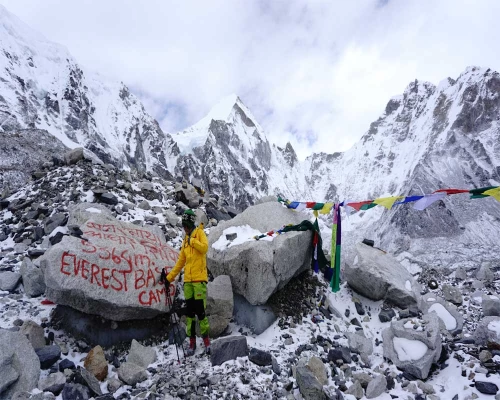
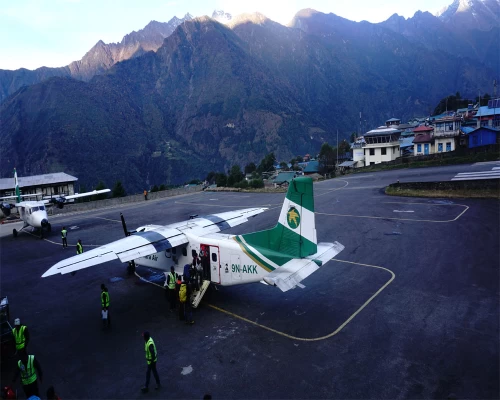
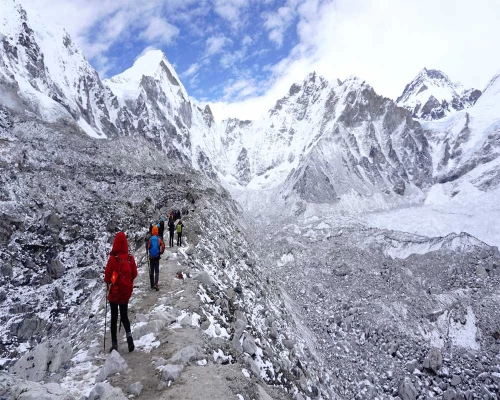
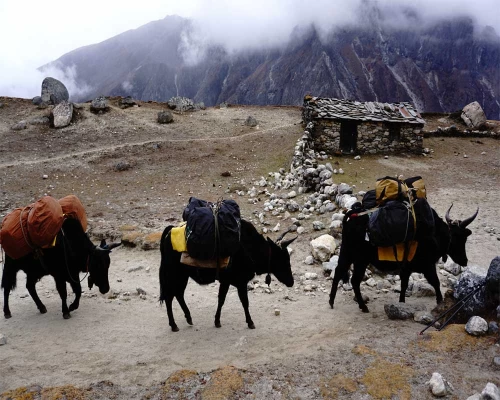
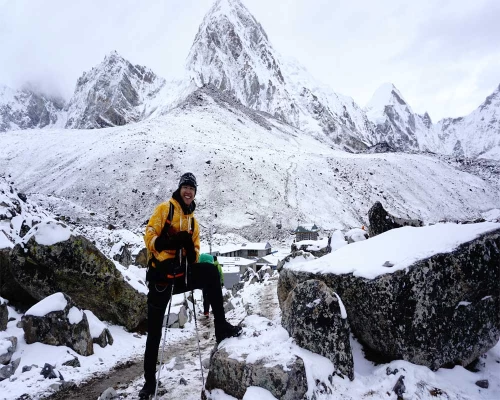
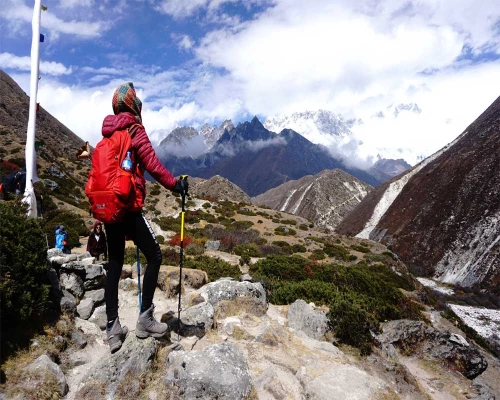

 5 reviews
5 reviews
